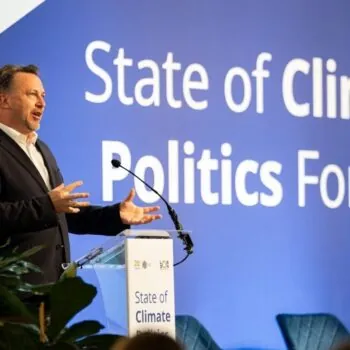This week at the annual meetings of the World Bank and IMF, ministers are discussing how much debt relief they can offer developing and middle-income countries as they grapple with the economic and financial fallout of the Covid-19 pandemic. The pandemic has been a painful lesson in how large-scale systemic risks can quickly dominate the geopolitical landscape.
In this context, E3G is launching a report arguing that the risk climate change poses to the stability of the global financial system threatens to spill over into international affairs and increase geopolitical tensions, if not managed. Avoiding a scenario where the implications of, and disagreements around, cumulative climate bailouts of sovereigns will require a much stronger degree of international cooperation than currently exists.
To date, dialogue on the risks climate poses to financial stability has focused mostly on how companies should prepare for and respond to rising insurance premiums and stranded fossil assets. Yet most of the world’s fossil fuels are owned by states, and state-owned entities. And it will be governments picking up the tab for more frequent and extreme climate-driven weather events. Covid-19 starkly illustrates how the international community and global financial architecture is woefully ill-prepared for a scenario of cascading sovereign insolvencies and the geopolitical consequences.
A new set of rules are urgently needed for how responsibility for climate financial risk is shared and managed between countries and institutions. Agreement is needed in two specific areas: first, how to respond to sovereign risk from climate change, including capital flight from vulnerable regions that could lead to instability; and second, how to improve debt transparency and prevent countries from attempting to offload underperforming fossil fuel assets to opaque jurisdictions.
Covid-19 must be a wake-up call. The potential size of these risks has already been exacerbated by the Covid-19 pandemic and the global debt crisis. But it also provides a window for the world to act now to address the discrepancy between the near certainty of transition and physical risks from climate change, and the failure to systematically consider and prepare for the possibility of cumulative sovereign defaults as a result. The paper offers several recommendations for near-term action to minimize the risk of this scenario.
Taylor Dimsdale, Director of Risk and Resilience said:
“Far too much investment is still going into fossil fuels. This won’t be one financial time bomb going off in a single year, but dozens if not hundreds of time bombs over decades. The G20 members can barely agree on a lunch order these days. But they will need to decide which countries get climate bailouts, and under what terms. Sovereign nations bear the risk, but it is everyday citizens in the poorest countries who will suffer most. The only solution is a coordinated global approach.”
Claire Healy, Director of Geopolitics and Climate Diplomacy said:
“Covid-19 is a wake-up call to the world to get its act together and figure out the global architecture and financial safety net for when multiple countries are at risk of default or insolvency. Climate-related financial risks are massive and lying dormant in the system. When it unravels, as it will – somebody will be left holding the bag. Which country? And what will the international community do? Who will pick up the tab? What happens if nobody does? This is a geopolitical risk as much as an economic and financial one, and needs urgent attention.”
Dileimy Orozco, Senior Policy Advisor said:
“COVID-19 is like a fire spreading through a city. So far the measures taken amount to fitting fire proof doors, but no one is calling for the fire brigade. The G20 should deliver a combination of both fire alarms and fire hydrants; the alarms being a better warning system for external shocks (such as climate change), whilst the fire hydrants represent the tools which can be brought to bear to quell crises.”
This paper has been produced as part of the MISTRA GEOPOLITICS programme, which is funded by the MISTRA – The Swedish Foundation For Strategic Environmental Research.



